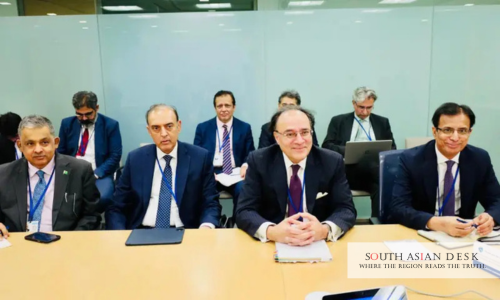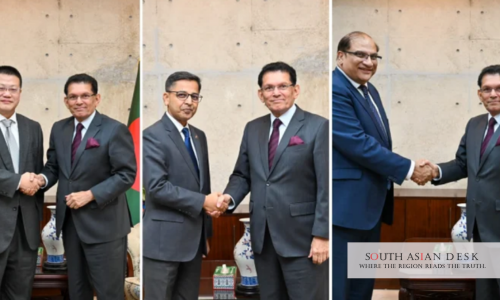Pakistan’s Finance Minister Muhammad Aurangzeb met IMF Director Jihad Azour in Washington on Monday to advance the Pakistan IMF reform agenda, reviewing progress on the $7 billion Extended Fund Facility amid the annual IMF-World Bank meetings.
The discussion, held on the sidelines of the October 13-18 gatherings, focused on sustaining structural reforms Pakistan-wide. No immediate tranche release was announced, but both sides reaffirmed commitment to macroeconomic discipline.
This engagement underscores Pakistan’s fragile economic recovery in South Asia, where IMF-backed reforms could unlock vital funding to combat inflation and debt, influencing regional stability from India to Bangladesh by curbing spillover risks like migrant flows and trade disruptions.
Aurangzeb IMF Meeting Spotlights Key Reforms
Finance Minister Aurangzeb led a delegation to Washington for the IMF and World Bank annual meetings. The core event was the Aurangzeb IMF meeting with Jihad Azour, Director of the IMF’s Middle East and Central Asia Department. Both exchanged views on the Pakistan IMF reform agenda. They reaffirmed a shared commitment to sustaining reform momentum.
The talks reviewed progress under the second review of the Pakistan EFF. Officials acknowledged the importance of maintaining macroeconomic discipline. Pakistan secured the $7 billion EFF in 2024 to stabilise its economy after a balance-of-payments crisis. This programme demands tough measures, including tax hikes and energy price adjustments.
Aurangzeb highlighted recent achievements. These include improved reserves covering three months of imports and a stable exchange rate. Inflation has declined, and remittances hit USD 38 billion last year, projected to reach USD 41-43 billion this fiscal year. Credit rating agencies like Moody’s upgraded Pakistan from Caa2 to Caa1.
The Pakistan IMF reform agenda centres on fiscal consolidation and revenue mobilisation. Government targets broadening the tax base through Federal Board of Revenue reforms. Structural reforms Pakistan prioritises include separating tax policy from administration. This aims to enhance efficiency and reduce corruption.
Pakistan EFF Review: Progress and Challenges
The Pakistan EFF review formed the crux of the Aurangzeb IMF meeting. IMF staff concluded talks on the second review without prior announcement of a staff-level agreement. Aurangzeb expressed optimism for finalising it during the visit. Successful completion could release the next tranche, worth about $1 billion.
Under the EFF, Pakistan met prior targets on primary surplus and foreign reserves. Gross reserves stood at USD 14.4 billion by end-September 2025, up from USD 9.4 billion a year earlier. Current account deficit narrowed to 0.1% of GDP in FY2025.
Yet challenges persist. Public debt remains high at 72% of GDP. Energy circular debt totals PKR 2.4 trillion, straining finances. The government resolved PKR 1,225 billion in power sector debt via a task force involving banks and the State Bank of Pakistan. This unlocks sovereign guarantees for sectors like agriculture and SMEs.
Structural reforms Pakistan pursues target state-owned enterprises. The Cabinet Committee on SOEs approved board reconstitutions for entities like Trading Corporation of Pakistan. Privatisation efforts focus on loss-making firms to cut fiscal burdens.
In related talks, Aurangzeb met World Bank Senior Managing Director Axel van Trotsenburg. They discussed climate resilience, vital for flood-vulnerable Pakistan. Recent floods devastated agriculture, shaving 2.5% off GDP growth in 2022. Both agreed on mobilising resources for adaptation and mitigation.
Structural Reforms Pakistan: Broader Engagements
Beyond the Aurangzeb IMF meeting, Aurangzeb held multiple sessions to bolster the Pakistan IMF reform agenda. With US Treasury’s Robert Kaproth and Jonathan Greenstein, he hailed a new tariff deal reducing duties on Pakistani exports to 19%. This boosts textiles and supports export-led growth.
Aurangzeb invited US investments in oil and gas, minerals, agriculture, and IT. He briefed on virtual assets legislation, aligning with global standards. The US-Pakistan Business Council session emphasised private sector-led growth. Aurangzeb assured relief for businesses facing high energy costs and taxes.
Meetings with Citi Bank representatives covered digital innovation. Pakistan positions itself as a regional hub for financial services. Proposals from Citi will undergo government review. With Islamic Development Bank’s Muhammad Sulaiman Al-Jasser, talks advanced M-6 motorway financing and polio eradication.
At the Commonwealth Finance Ministers’ Meeting, Aurangzeb pushed for climate financing. He supported operationalising the Loss and Damage Fund, critical for South Asian nations. Pakistan seeks enhanced access to USD 100 billion annual climate pledges.
These engagements tie into structural reforms Pakistan-wide. Energy sector reforms include tariff rationalisation to end subsidies worth PKR 500 billion annually. Tax reforms aim to raise revenue to 15% of GDP by FY2028 from 10.5%. SOE rightsizing targets reducing the fiscal deficit to 5.9% this year.
Government data shows FY2025 growth at 2.7%, up from 0.3% last year. Inflation fell to 7.8% in September from 29.2% peaks. Yet, unemployment hovers at 6.3%, and youth joblessness at 10.7% demands urgent skills development.
Background
Pakistan’s IMF ties date to 1950, with 24 programmes since. The current EFF, approved July 2024, follows a 2023 standby arrangement. It addresses chronic deficits amid political instability and climate shocks. South Asia’s largest economy by population, Pakistan’s reforms influence regional dynamics, including Afghan refugee costs and India trade frictions.
The Washington visit aligns with post-election stabilisation under Prime Minister Shehbaz Sharif. Aurangzeb, appointed March 2024, brings banking expertise from HBL. His agenda emphasises FDI, projected at USD 2.5 billion this year.
What’s Next
IMF Executive Board approval of the EFF review could come by November 2025. Pakistan eyes a Resilience and Sustainability Facility for climate aid. Further structural reforms Pakistan commits to include provincial fiscal harmonisation and export incentives.
The Pakistan IMF reform agenda will shape budget FY2026, due June 2026. Success hinges on political will and external support, potentially averting default risks.
Aurangzeb’s Washington push reinforces the Pakistan IMF reform agenda as a cornerstone for inclusive growth.
Published in SouthAsianDesk, October 14th, 2025
Follow SouthAsianDesk on X, Instagram, and Facebook for insights on business and current affairs from across South Asia.






